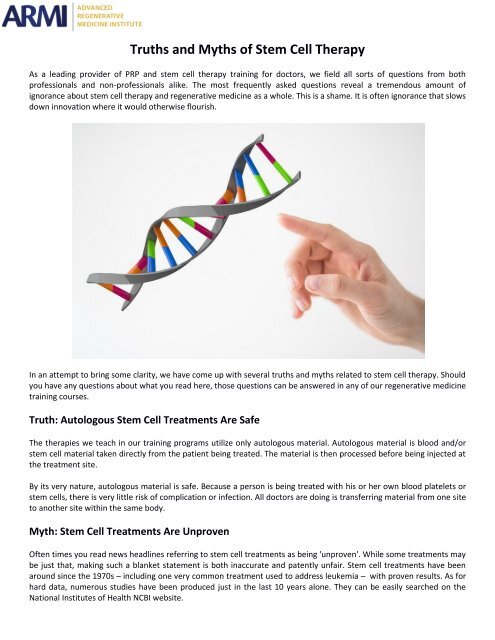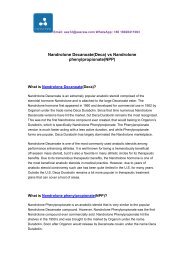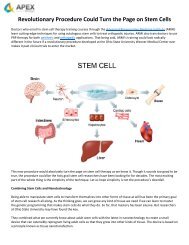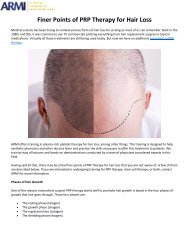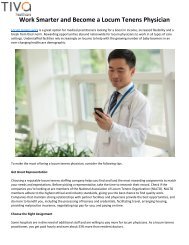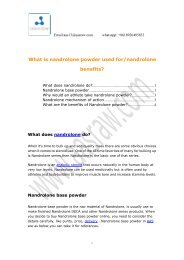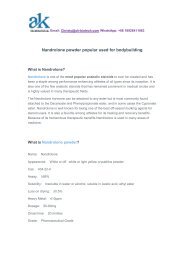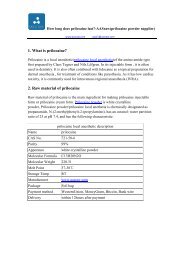Truths and Myths of Stem Cell Therapy
https://advancedregenmedinstitute.com/ - As a leading provider of PRP and stem cell therapy training for doctors, we field all sorts of questions from both professionals and non-professionals alike. The most frequently asked questions reveal a tremendous amount of ignorance about stem cell therapy and regenerative medicine as a whole. This is a shame. It is often ignorance that slows down innovation where it would otherwise flourish.
https://advancedregenmedinstitute.com/ - As a leading provider of PRP and stem cell therapy training for doctors, we field all sorts of questions from both professionals and non-professionals alike. The most frequently asked questions reveal a tremendous amount of ignorance about stem cell therapy and regenerative medicine as a whole. This is a shame. It is often ignorance that slows down innovation where it would otherwise flourish.
Create successful ePaper yourself
Turn your PDF publications into a flip-book with our unique Google optimized e-Paper software.
<strong>Truths</strong> <strong>and</strong> <strong>Myths</strong> <strong>of</strong> <strong>Stem</strong> <strong>Cell</strong> <strong>Therapy</strong><br />
As a leading provider <strong>of</strong> PRP <strong>and</strong> stem cell therapy training for doctors, we field all sorts <strong>of</strong> questions from both<br />
pr<strong>of</strong>essionals <strong>and</strong> non-pr<strong>of</strong>essionals alike. The most frequently asked questions reveal a tremendous amount <strong>of</strong><br />
ignorance about stem cell therapy <strong>and</strong> regenerative medicine as a whole. This is a shame. It is <strong>of</strong>ten ignorance that slows<br />
down innovation where it would otherwise flourish.<br />
In an attempt to bring some clarity, we have come up with several truths <strong>and</strong> myths related to stem cell therapy. Should<br />
you have any questions about what you read here, those questions can be answered in any <strong>of</strong> our regenerative medicine<br />
training courses.<br />
Truth: Autologous <strong>Stem</strong> <strong>Cell</strong> Treatments Are Safe<br />
The therapies we teach in our training programs utilize only autologous material. Autologous material is blood <strong>and</strong>/or<br />
stem cell material taken directly from the patient being treated. The material is then processed before being injected at<br />
the treatment site.<br />
By its very nature, autologous material is safe. Because a person is being treated with his or her own blood platelets or<br />
stem cells, there is very little risk <strong>of</strong> complication or infection. All doctors are doing is transferring material from one site<br />
to another site within the same body.<br />
Myth: <strong>Stem</strong> <strong>Cell</strong> Treatments Are Unproven<br />
Often times you read news headlines referring to stem cell treatments as being 'unproven'. While some treatments may<br />
be just that, making such a blanket statement is both inaccurate <strong>and</strong> patently unfair. <strong>Stem</strong> cell treatments have been<br />
around since the 1970s – including one very common treatment used to address leukemia – with proven results. As for<br />
hard data, numerous studies have been produced just in the last 10 years alone. They can be easily searched on the<br />
National Institutes <strong>of</strong> Health NCBI website.
Myth: <strong>Stem</strong> <strong>Cell</strong> Treatments Are Unregulated<br />
H<strong>and</strong>-in-h<strong>and</strong> with the unproven argument is the myth that stem cell treatments are unregulated. They are not. The FDA<br />
is very clear about the definition <strong>of</strong> autologous material <strong>and</strong> how it can be used. As long as doctors do not perform<br />
treatments outside <strong>of</strong> the current scope, they do not have to have individual procedures approved.<br />
Having said that, the FDA approved its first autologous procedure to repair damaged knee cartilage late in 2016. This<br />
procedure involves a product known as Maci. Keep in mind that the FDA only approves treatments after applicants<br />
demonstrate said treatments actually work. Also underst<strong>and</strong> that approved treatments are regulated treatments.<br />
Truth: <strong>Stem</strong> <strong>Cell</strong> Treatments Are Not a Cure-All<br />
It is true that stem cell treatments are not a cure-all for every ailment man suffers from. In fact, the practical uses <strong>of</strong><br />
stem cell <strong>and</strong> PRP therapies are limited at this time. The previously stated leukemia treatment is one example, the kinds<br />
<strong>of</strong> treatments we teach doctors – primarily musculoskeletal treatments – round out what is currently available. Research<br />
is ongoing in an attempt to find other applications.<br />
Myth: <strong>Stem</strong> <strong>Cell</strong> Treatment Is an Invasive Surgery<br />
Critics <strong>of</strong> stem cell therapy like to play semantic games by saying the use <strong>of</strong> needles for extraction <strong>and</strong> injection make<br />
treatment just as invasive as surgery. By the technical definition <strong>of</strong> the word, piercing the skin with a needle is invasive.<br />
But stem cell therapy <strong>and</strong> surgery are not even in the same ballpark for invasiveness. <strong>Stem</strong> cell therapy is minimally<br />
invasive while surgery is as invasive as it can be.<br />
The misinformation surrounding PRP <strong>and</strong> stem cell therapies should not prevent you from undergoing training so that<br />
you can <strong>of</strong>fer the treatments to patients. For more information about our training, feel free to contact Advanced<br />
Regenerative Medicine Institute (ARMI) at your earliest convenience.


